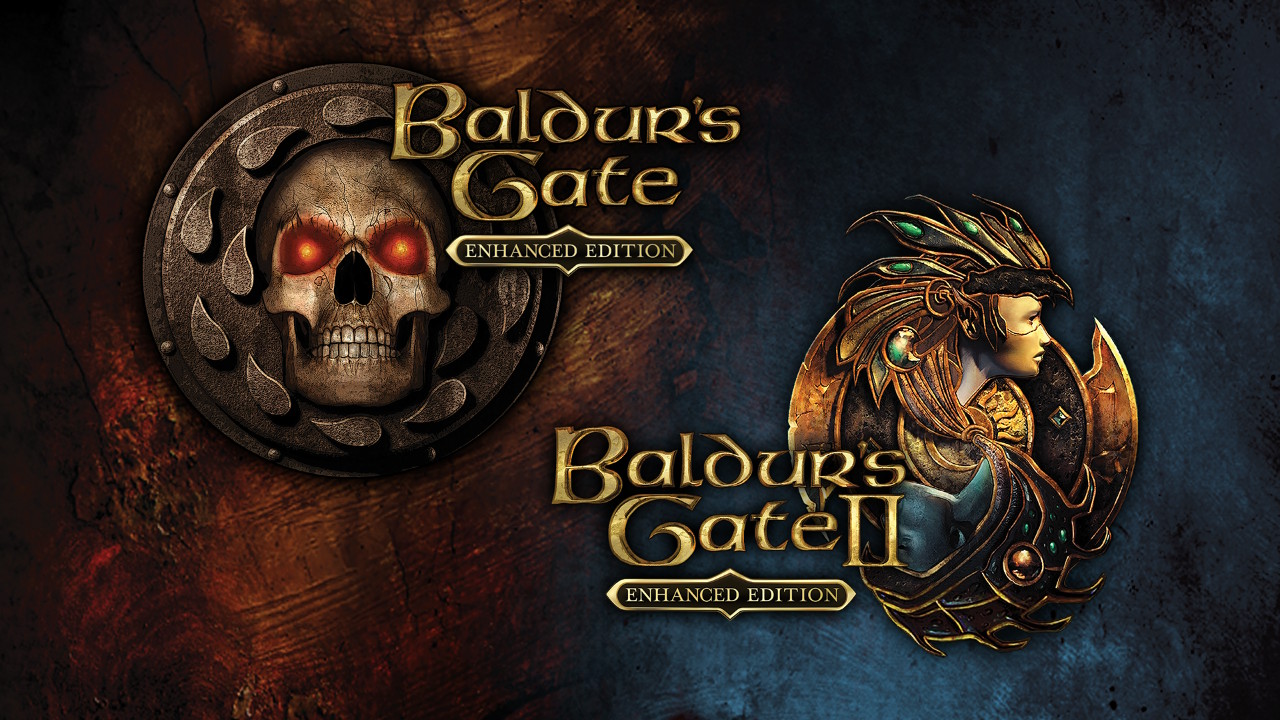[Review] Baldur’s Gate and Baldur’s Gate II: Enhanced Editions – Nintendo Switch
Baldur’s Gate and Baldur’s Gate II: Enhanced Editions
Nintendo Switch
Developed By: Beamdog
Published By: Beamdog
Category: Role-Playing, Adventure
Release Date: 10.15.19
It was 1998. Consoles and Japanese companies like Squaresoft had all but vanquished the western computer RPG as a major force in the game industry. CRPGs were desperate for a savior – and they had it, like a year before when the first Fallout game was released. But I didn’t play that when it came out, and anyway they needed a second hit, something to take the revolutionary implementation of branching narrative paths and the fledgling open-world concept to the next level. And that is where the first of today’s games came in: Baldur’s Gate launched to commercial and critical success in December 1998, powered by the Bioware-developed Infinity Engine. The same engine was used to develop the sequel, Baldur’s Gate II, as well as two additional games, Icewind Dale and Planescape: Torment.
Young John picked up Baldur’s Gate at a small PC convention in early 1999. I eventually beat it after a few restarts caused by a desire to try other character classes and gaining a better understanding of my priorities in character generation. When I beat it, I rolled a new character and started again. I followed pretty much the same path for the entire Infinity Engine line. These games were all remastered within the last five years on PC, all of which I purchased ASAP despite not really having a gaming PC at the time. And now, in a twist Young John would never have believed, Beamdog has accomplished the impossible and brought Baldur’s Gate, Baldur’s Gate II, Icewind Dale, and Planescape: Torment to the Nintendo Switch in a couple of double packs. When the codes came in, I could have written the reviews for these games almost entirely from memory; long story short, they’re really friggin’ good. The only thing I needed to play them to find out was how well the controls translate to a controller. We’re going to do a full review anyway, since that’s kind of what I’m here for.
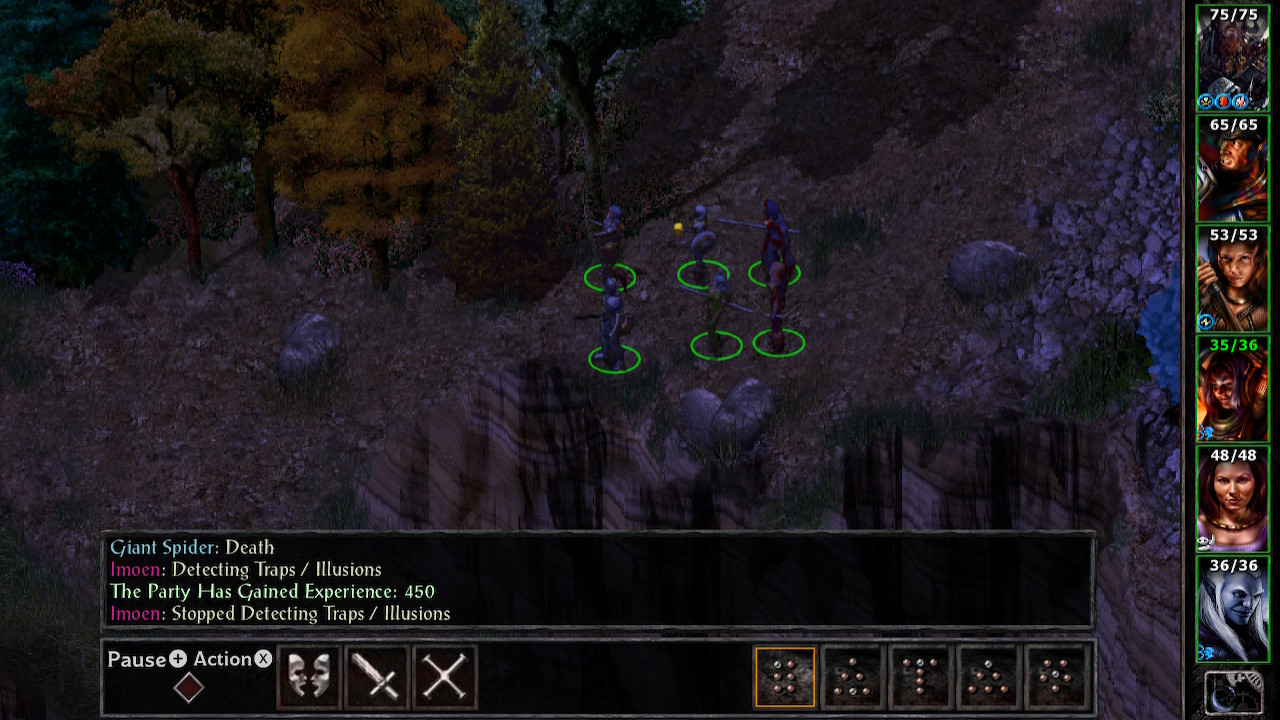
Tales of the Sword Coast… and Athkatla
The first two-pack consists of the original Baldur’s Gate and its sequel, Baldur’s Gate II in addition to all of the original expansion content and the brand-new DLC Beamdog has created. For all you kids out there, before we had DLC, extra content was released in expansion packs on discs. In my mind, BG and BGII aren’t really even separate games. They’re just one big tale of a kid from Candlekeep facing their destiny. And then facing their next destiny… and possibly a third destiny. But that’s it! More than three destinies is just plain crazy.
Baldur’s Gate opens with your character and their foster father, Gorion, running from the walled library of Candlekeep to try to get ahead of the dangerous fate awaiting the protagonist. Gorion is killed shortly after departing Candlekeep, leaving your character to fend for themselves against a steadily growing conspiracy involving bandits, mercenaries, political factions, and the children of a slain murder god. BG is one of the most legendary and popular RPGs of all time, but we’ll hold the spoilers there just in case anyone reading is new to the series and move on to the sequel. BGII picks up a few years after the events of the first game, and sees our protagonist in dire straits; a mysterious wizard has kidnapped them and their party and seems intent on performing some pretty invasive experiments on our heroes in search of… well, we’re not doing the spoiler thing today. Suffice it to say, the second chapter is as thrilling as the first.
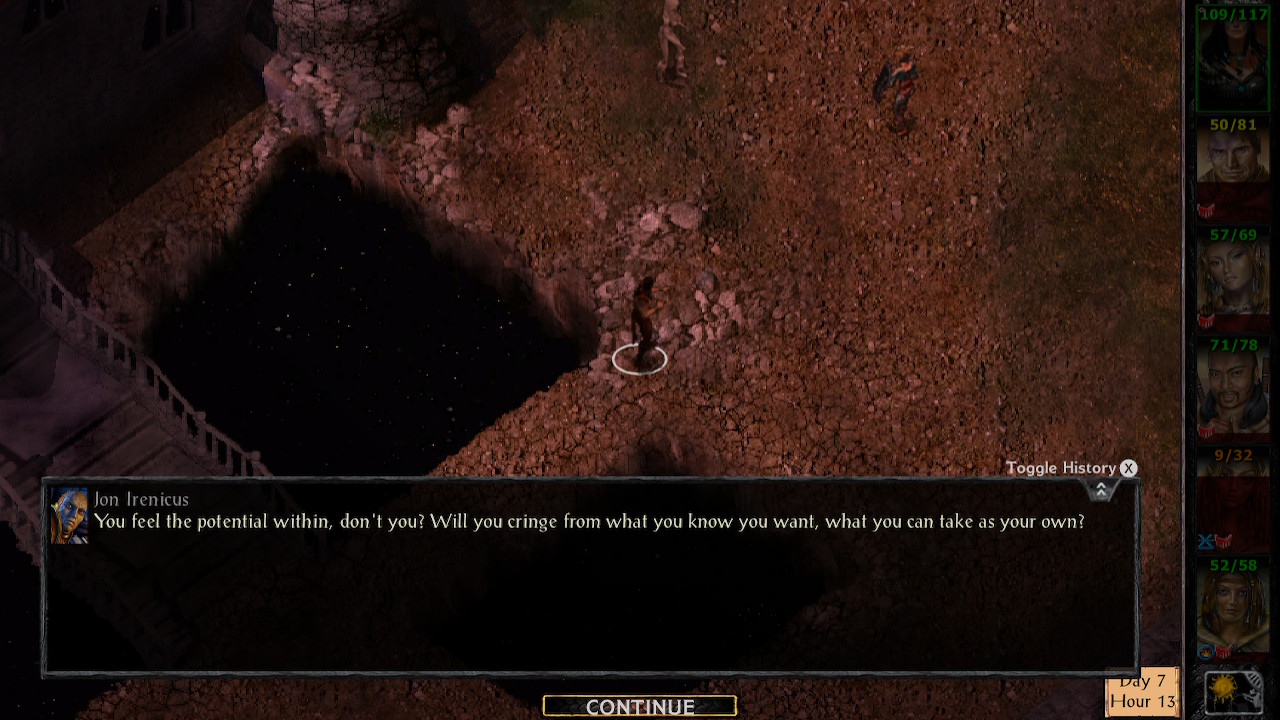
Decide Your Fate
What truly blew my mind about Baldur’s Gate back in the day was the major impact player choice had on the way the story unfolded. I could choose to be a hero or a villain, or I could just wander around randomly and move things forward completely by chance, and the game would react to that! To a certain degree, I got to set my own objectives and values, as opposed to, say, a Final Fantasy game where the path of the narrative is determined solely by the script. Watching that system evolve and grow more immersive and engrossing over the next few years hugely influenced my expectations for what a game could achieve. You can also see the basic formula of Bioware’s future RPG series taking shape; Baldur’s Gate contains dozens of characters to recruit, often with their own small questlines. Each character doesn’t have their own multi-part task to achieve, like, say, a Dragon Age or Mass Effect, but you can see the idea starting to form.
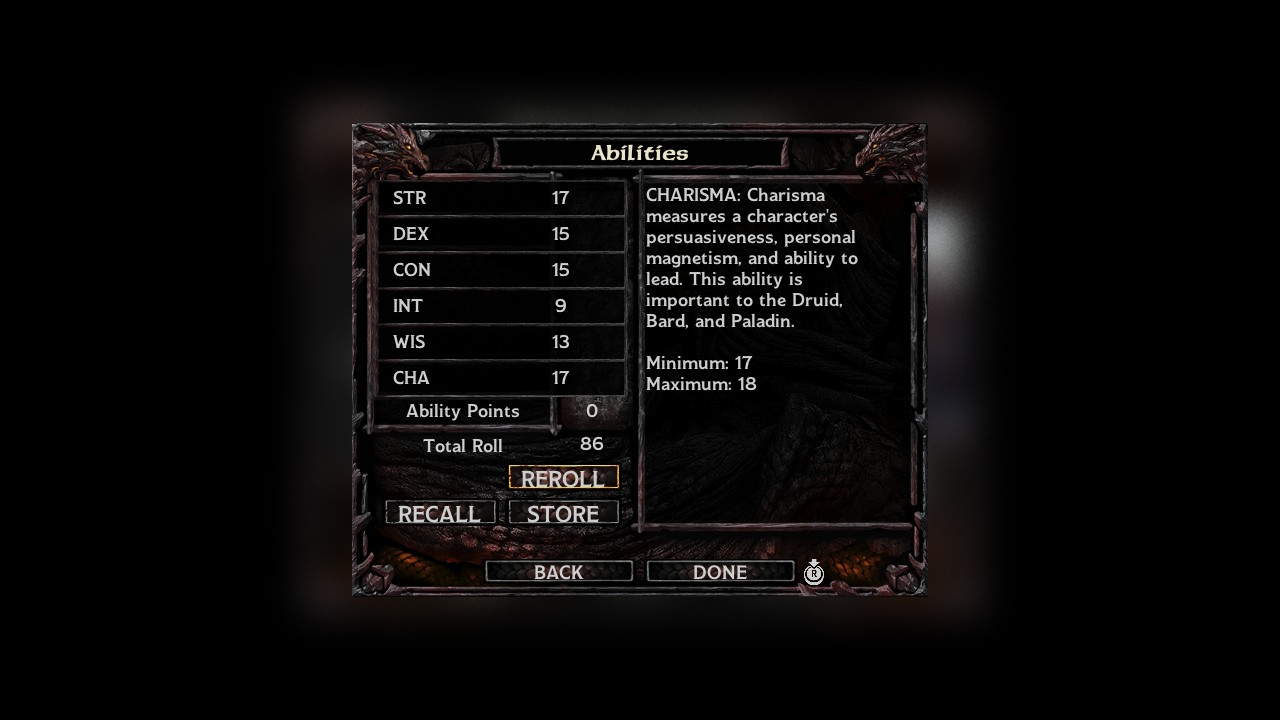
The Art of Creation
Creating a new character was always the most engrossing part of the Baldur’s Gate series for me, or indeed for the whole Infinity Engine quartet. Rolling stats to see how high you could bring your base statistics, distributing thief skill points, or choosing what spells to learn as a first-level wizard consumed hours of my playtime in this series – and that didn’t change when I installed the games on the Switch. The single best thing about the Enhanced Editions is that the character generation screen adds up all your stat points for you, so you know how well you’ll be able to redistribute your points based on that. It made character generation a lot less time-consuming for me, but somehow also more obsessive; I just kept hitting re-roll to see if I could squeeze out just one more point. The more 18s the better, after all.
But customizing your character doesn’t stop at the creation aspect; you will also level up as you gain experience, which grants your character more points to spend on their skills and a larger pool of hit points, among other things. Leveling up goes a bit slower here than in some other RPGs however, so the majority of powering up your characters happens via finding and equipping more powerful weapons, armor, and accessories. Looting slain opponents and anything that isn’t nailed down becomes as important as anything in terms of strengthening your character, and luckily there are dozens of powerful pieces of equipment to be found. The first game gets off to a slow start in the magical weapons category; it takes a while before magic items start raining from the sky, but once they do collecting them is fully satisfying.
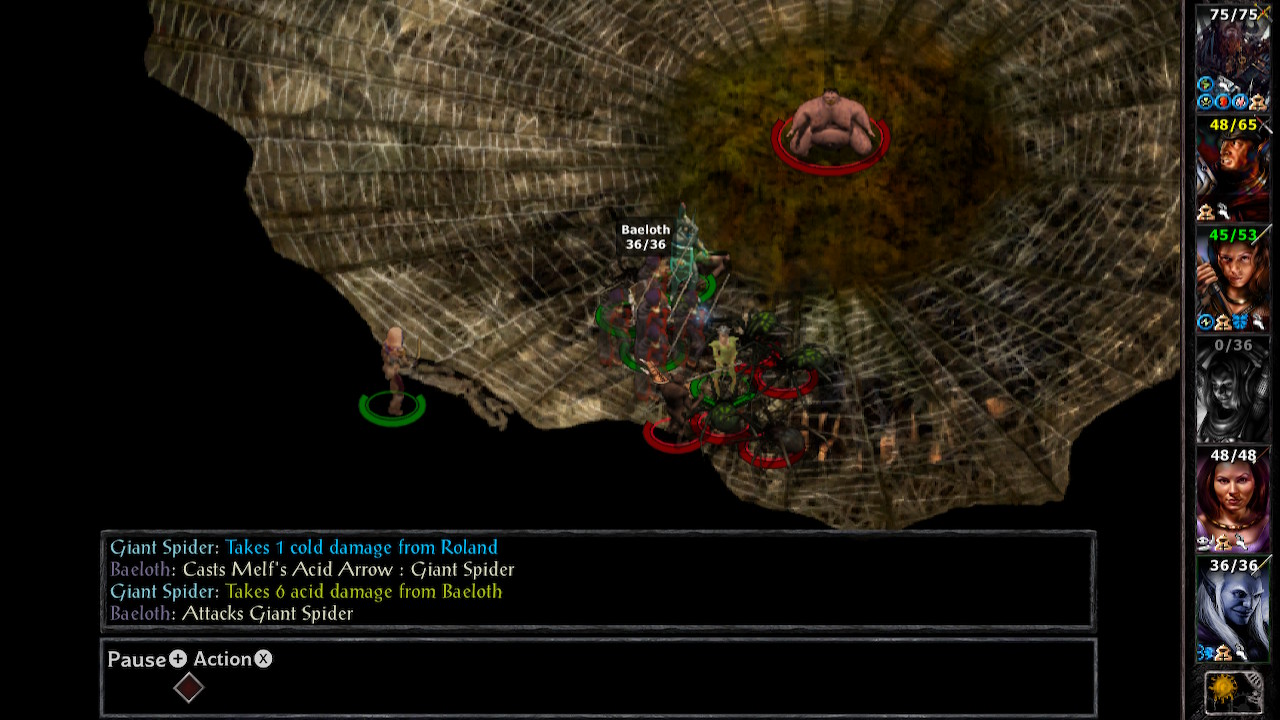
Real-Time or Turn-Based? Why Choose Just One?
Combat is a great mix of real-time and turn-based concepts. Every turn plays out in semi-real-time, with each character having a number of actions they can take within that turn. Some characters are fast enough to attack twice in a turn, while casting powerful spells can take multiple turns. The action plays out in a real-time format, however, which can be paused at any time. Pausing is the key to a winning strategy – selecting a spell, ability, or other action during combat is difficult to assign fast enough in real-time to be very effective. The breadth of skills available to you is also available to your enemies, which makes for an engaging depth of strategy in selecting which buffs or debuffs to cast. Picking the right abilities or equipment to be ready for any situation is part of the fun of character progression – or you can savescum it and pick the right spells after your enemies have turned you into a fine red mist and you try again.
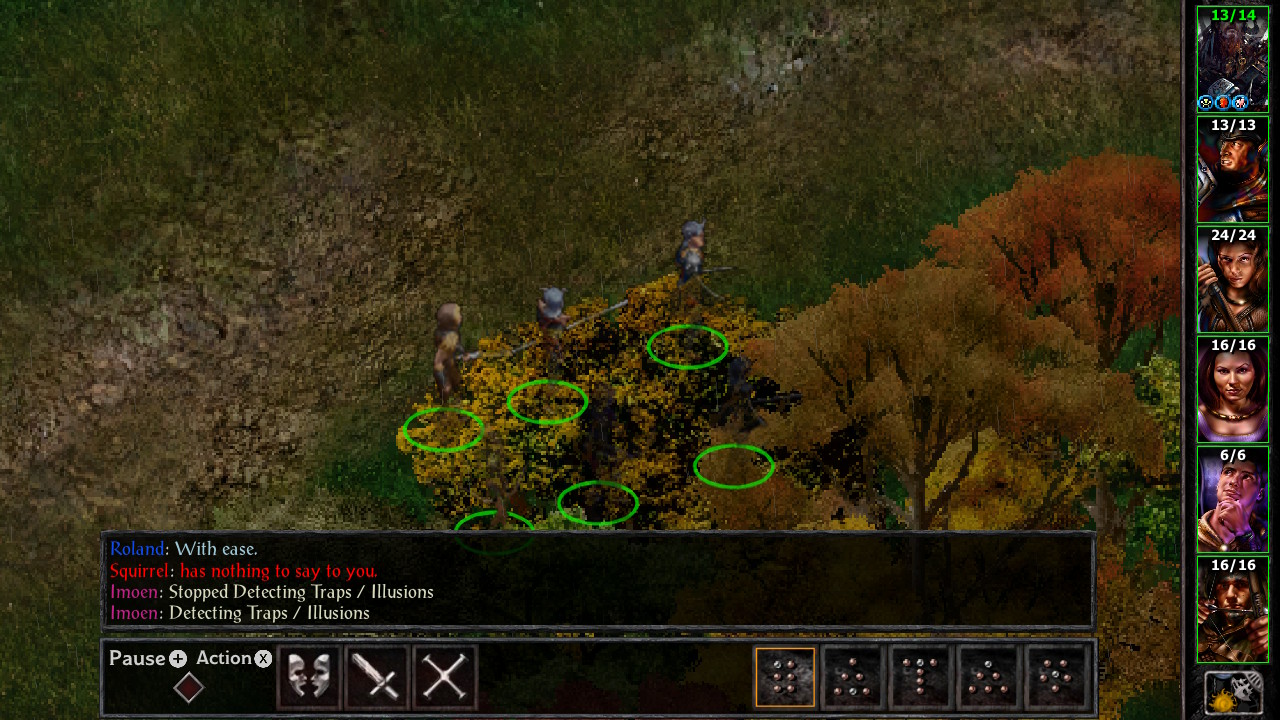
Helpful Input
I already knew I would love the story and the game system; I grew up loving them, and they were exactly as unique, complex, and immersive as I remember. My big worry was using a controller to play; the Infinity Engine quartet were developed for use with a mouse and keyboard, and I just wasn’t sure a controller had enough flexibility to effectively manage the game. While I still believe a mouse and keyboard is the superior way to play these games, I came away very impressed with how the controls were adapted for a controller. It took me a few hours to get used to the control scheme, but once I had played around with it a while things felt very logical and even became pretty intuitive.
I was most worried about controlling my party during battle, but pausing the action frequently took care of any loss of efficiency in inputting commands and navigating the command inputs is not that bad once you get some practice. Navigating menus and the inventory screen is decidedly smoother with a mouse and keyboard, but everything else is about even in terms of effort. Unfortunately, navigating menus and manipulating your inventory is a huge part of the game. However, after a few hours I had the menu controls down and it was at most a very minor inconvenience. Managing the inventory screen inputs still felt sluggish even with experience, which is a bit of a disappointment. Still, a sluggish inventory system isn’t enough to ruin the experience; after all, the original Mass Effect remains one of my favorite games of all time, and the inventory system in that game was downright awful.
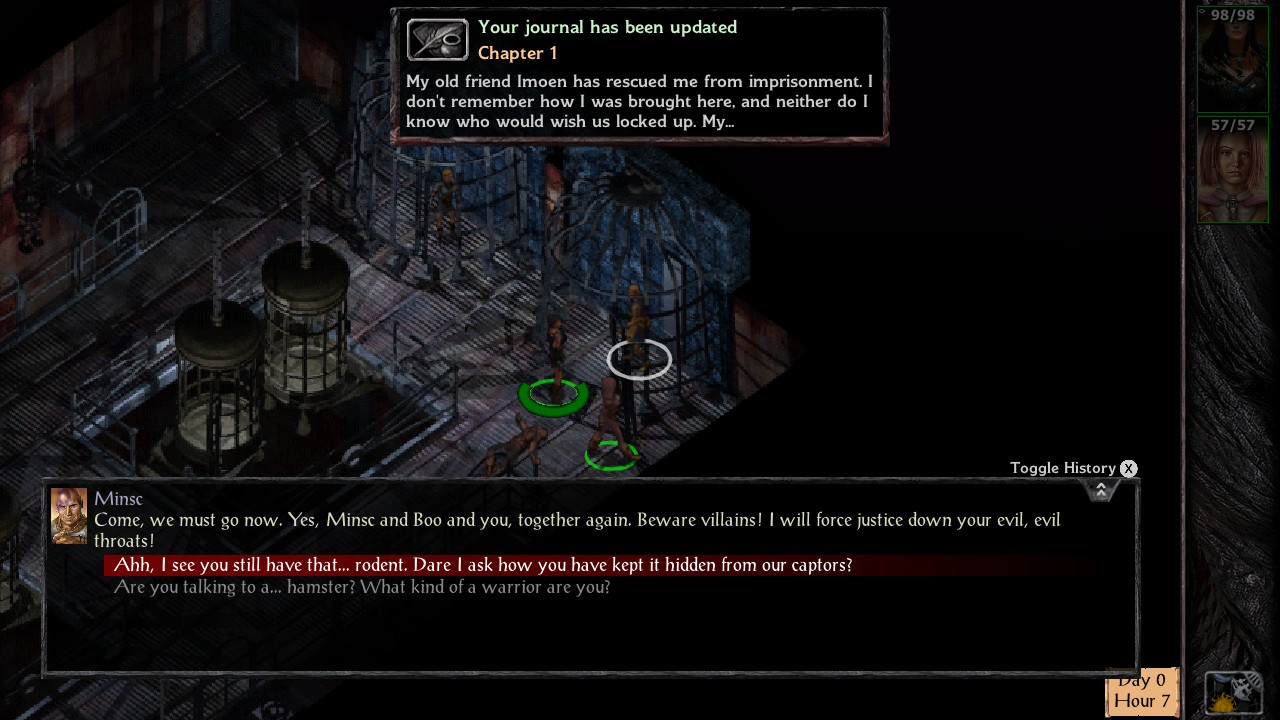
It Looks Better Than It Did in 1998
Graphically, even despite the remastering and enhancing, both BG and BGII look a little dated. That’s sort of to be expected when the original game is over twenty years old, though. I don’t mean to say that the game looks terrible; perhaps I’m just viewing things through a veil of nostalgia, but I think the game still looks pretty decent. The audio fares better in that respect; it sounds crisp, clean, and not even a little grainy. The voice acting is top notch, when it’s there; only a few key plot-related interactions have it, though.
Living History
The Baldur’s Gate and Baldur’s Gate II Enhanced Editions are every bit as good as I remember the original versions being when I was younger; the EEs are every bit as good as I remember them being on the PC, too. The game system is challenging and fun, the story is epic and engaging, and the world is huge and full of places to explore. The graphics are presentable, though not exactly up to today’s standards, and the control scheme is surprisingly equal to the task of making the games playable without a keyboard and mouse. There are a few areas that lack the efficiency of the traditional PC input, but not that many. This game is a must-play for RPG fans, game historians, and anyone who believes in the power of narrative in games.





Buy Baldur’s Gate and Baldur’s Gate II: Enhanced Editions
$49.99
Follow Beamdog

*A game code was provided for review purposes.

